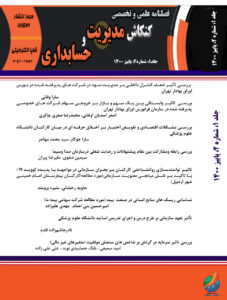مقاله: پژوهشی
صفحه: 347- 364
نویسندگان:
نسرین پور عطار[1]، یوسف گرجی[2]
[1] گروه روانشناسی، دانشکده علوم انسانی، دانشگاه آزاد خمینی شهر، اصفهان، ایران. pourattar3390@gmail.com
[2] گروه روانشناسی، دانشکده علوم انسانی، دانشگاه آزاد خمینی شهر، اصفهان، ایران. gorji@iaukhsh.ac.ir
چکیده
پژوهش حاضر به منظور تعیین اثربخشی آموزش واقعیت درمانی بر خودکنترلی مادران و نشانههای اختلال نافرمانی مقابلهای کودکان 4 تا 6 سال دختر و پسر شهر اصفهان انجام شده است. روش پژوهش، طرح پیش آزمون–پس آزمون با گروه آزمایش و گواه با جایگزینی تصادفی است که برای اجرای پژوهش، در ابتدا از بین مهدکودکهای شهر اصفهان، به صورت هدفمند چهار مهدکودک و تعداد 40 نفر به طور تصادفی انتخاب شدند، از طریق پرسشنامه اختلال نافرمانی مقابلهای که به مادران داوطلب داده شد، از بین آنها 30 نفر از کسانی که در پرسشنامه نافرمانی مقابلهای نمره بالاتری در حد تشخیص آوردند انتخاب و سپس مادران کودکان مبتلا به اختلال نافرمانی مقابلهای به روش جایگزینی تصادفی به 2 گروه 15 نفر آزمایش و 15 نفر کنترل قرار گرفتند. مادران گروه آزمایش 8 جلسه 90 دقیقهای آموزش واقعیت درمانی را دریافت کردند. قبل و بعد از پایان جلسات، آزمون توسط ابزار پرسشنامه خودکنترلی تانجی و پرسشنامه اسنپ چهارSNAP-IV، از آنها به عمل آمد. به منظور تجزیه و تحلیل دادهها از آزمون تحلیل کوواریانس استفاده شد. بر اساس نتایج به دست آمده، در گروه آزمایش، نسبت به گروه گواه، در مراحل پسآزمون متغیر خودکنترلی افزایش معنادار داشته و همچنین اثر آموزش واقعیت درمانی باعث کاهش متغیر نافرمانی مقابلهای در کودکان گردیده است. بر اساس نتایج پژوهش حاضر آموزش مادران به شیوه واقعیت درمانی میتواند روش کارآمدی در بهبود علائم رفتاری اختلال نافرمانی مقابلهای در کودکان و نیز خودکنترلی مادران باشد.
کلمات کلیدی:
اختلال نافرمانی مقابلهای، آموزش واقعیت درمانی، کودکان، خودکنترلی.
Nasrin Pour Attar[1], Yousef Gorji[2]
[1] Department of Psychology, Faculty of Humanities, Khomeini Shahr Azad University, Isfahan, Iran. pourattar3390@gmail.com
[2] Department of Psychology, Faculty of Humanities, Khomeini Shahr Azad University, Isfahan, Iran. gorji@iaukhsh.ac.ir
abstract
The present study was conducted to determine the effectiveness of reality therapy training on mothers’ self-control and symptoms of oppositional defiant disorder in 4- to 6-year-old boys and girls in Isfahan. The research method is a pretest-posttest design with experimental and control groups with random replacement. To conduct the research, initially, four kindergartens and 40 people were randomly selected from kindergartens in Isfahan. Through the oppositional defiant disorder questionnaire that was given to volunteer mothers, 30 of them were selected from those who scored higher than the diagnostic level in the oppositional defiant disorder questionnaire. Then, the mothers of children with oppositional defiant disorder were randomly assigned to 2 groups of 15 experimental and 15 control groups. Mothers in the experimental group received 8 sessions of 90-minute reality therapy training. Before and after the sessions, they were tested using the Tangey Self-Control Questionnaire and the SNAP-IV questionnaire. The analysis of covariance test was used to analyze the data. According to the results, in the experimental group, compared to the control group, the self-control variable increased significantly in the post-test stages, and the effect of reality therapy training reduced the oppositional defiant variable in children. According to the results of the present study, training mothers in the reality therapy method can be an effective method in improving the behavioral symptoms of oppositional defiant disorder in children and also the self-control of mothers.
Keywords:
Oppositional defiant disorder, reality therapy training, children, self-control.
